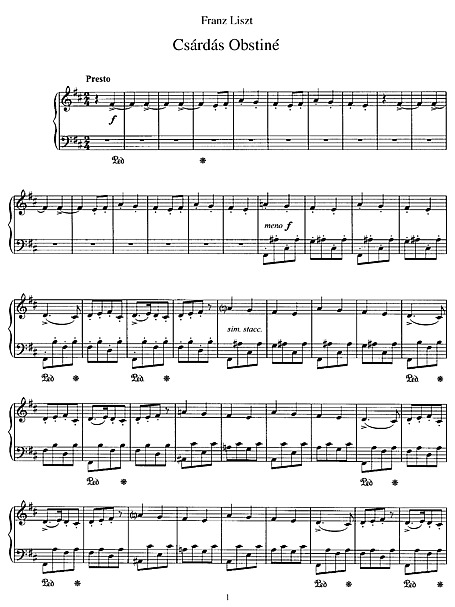Two Czárdás
No. 2 Czárdás obstinée

- Kompozytor
- F Liszt
- Opus
- S 225
- Year composed
- 1884
- Strony
- 7
- Instrumenty
- Fortepian
- Trudność
- Grade 8
- Licencja
- Domena publiczna
- Dodane przez
- Tony Wilkinson
- Wielkość pliku
- 304 KB
Recenzje
Kliknij aby ocenić
O Two Czárdás
The three csárdás that Franz Liszt wrote in 1881–82 and 1884 are solo piano pieces based on the Hungarian dance form of the same name. Liszt treats the dance form itself much less freely than he did much earlier with the verbunkos in the Hungarian Rhapsodies, and the material itself remains more specifically Hungarian than gypsy in thematic material. Their spare lines, angular rhythms and advanced harmonies show these pieces to be direct ancestors of the compositions of Béla Bartók. Because of these attributes, the csárdás are considered by Liszt scholars among the more interesting of the composer's late output.
Powyższy tekst jest udostępniany na licencji Creative Commons Attribution-ShareAlike. Zawiera treść z artykułu z Wikipedii "Czárdás (Liszt)".
Powyższy tekst jest udostępniany na licencji Creative Commons Attribution-ShareAlike. Zawiera treść z artykułu z Wikipedii "Czárdás (Liszt)".
Free sheet music on other sites
More music by Ferenc Liszt
 ♪
♪- La Campanella
Fortepian
- La Campanella
 ♪
♪- Hungarian Rhapsody No. 2
Fortepian
- Hungarian Rhapsody No. 2
 ♪
♪- Liebesträume
Liebestraum No. 3 - Fortepian
- Liebesträume
 HQ
HQ- Salve Regina
SATB a Capella - SATB, Dźwięk
- Salve Regina
 ♪
♪- Liebesträume
Liebestraum No. 3 - Fortepian
- Liebesträume
Other users also liked
 ♪
♪- Czardasz
Piano accompaniment - Vittorio Monti
- Fortepian
- Czardasz

- Czárdás macabre
Fortepian - Ferenc Liszt
- Czárdás macabre

- Hungarian Rhapsody No. 1
- Ferenc Liszt
- Hungarian Rhapsody No. 1

- Tscherkessenmarsch
From Glinka's Opera Ruslan i Lyudmila - Ferenc Liszt
- Fortepian
- Tscherkessenmarsch

- Die drei Zigeuner
- Ferenc Liszt
- Die drei Zigeuner









